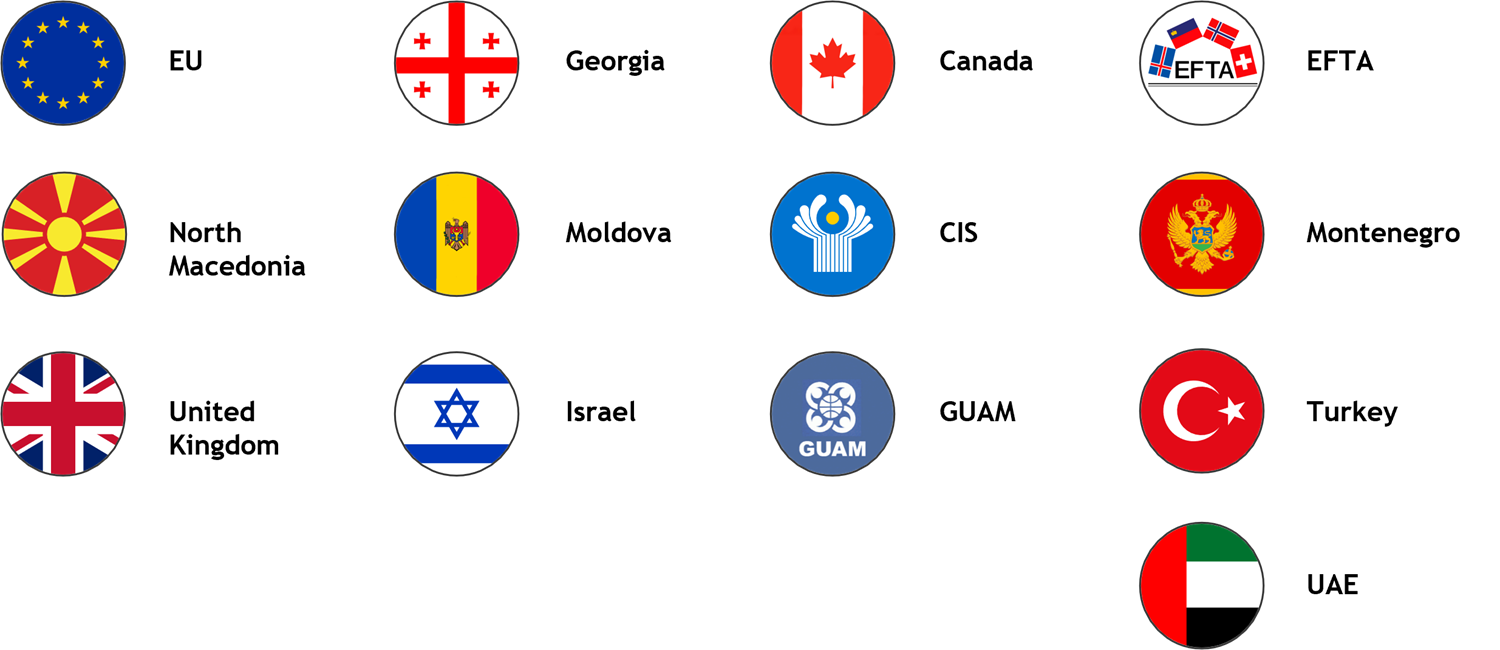Free trade agreements
Ukraine and other countries have signed 25 free trade agreements covering the markets of 47 countries.

1. UPDATED FREE TRADE AGREEMENT BETWEEN UKRAINE AND THE EFTA
- Date of signature: 8 April 2025
- Main provisions:
Key changes:
• Complete abolition of duties on industrial products.
• Cancellation and reduction of duties on a significant part of agricultural goods:
- Iceland — 142 duty-free goods.
- Norway — 107 duty-free goods, 78 — with reduced rates.
- Switzerland and Liechtenstein — 427 duty-free goods, 163 with reduced rates.
• Overall growth in duty-free goods: 66.2%.
New sections of the Agreement:
• E-commerce: legal regulation of e-commerce, signatures, contracts, paperless trade.
• Small and medium-sized enterprises (SME): improved access to information, contact points, publication of information in English.
• Trade and sustainable development: environmental and social standards in trade relations.
Updated provisions:
• Trade in goods and SPS measures: in accordance with WTO agreements.
• Simplification of trade procedures: transparency in licensing, clear rules for exporters.
• Public procurement: improving access of Ukrainian suppliers to EFTA markets.
• Intellectual property: cooperation and protection.
- Expected results:
• Increased access of Ukrainian goods and services to the markets of the EFTA countries.
• Recovery of the Ukrainian economy.
• Strengthening economic cooperation and trade relations with Norway, Iceland, Switzerland and Liechtenstein.
• Promoting the modernisation and digitalisation of trade procedures to increase efficiency.
2. COMPREHENSIVE ECONOMIC PARTNERSHIP AGREEMENT BETWEEN UKRAINE AND THE UNITED ARAB EMIRATES (UAE)
- Date of signing: 17 February 2025
- Main provisions:
• Free access of Ukrainian goods to the UAE market for 96.6% of product lines.
• Lifting of restrictions on the share of foreign capital at 49% for Ukraine that will allow entrepreneurs to register companies with up to 70% of foreign capital, and gradually up to 100% in certain sectors.
• Facilitating digital trade and abolishing duties on electronic services.
• Establishment of the Ukraine-UAE Investment Council.
- Expected results:
• Attracting investments from the UAE to Ukraine.
• Simplifying the registration of Ukrainian companies in the UAE.
• Growth of Ukrainian exports in key sectors: metallurgy, food industry, in particular flour milling and oil production.
3. UPDATE OF THE AGREEMENT BETWEEN UKRAINE AND THE UNITED KINGDOM OF GREAT BRITAIN AND NORTHERN IRELAND ON POLITICAL COOPERATION, FREE TRADE AND STRATEGIC PARTNERSHIP
- Date of signature: 8 February 2024 (ratified by Ukraine on 22.08.2024)
- Main provisions:
• Deeper tariff liberalisation: amendments to the Agreement on Political Cooperation, Free Trade and Strategic Partnership between Ukraine and the United Kingdom of Great Britain and Northern Ireland were introduced, which provide for the abolition of all import duties and tariff quotas in bilateral trade.
• The agreement will be in force until 31 March 2029, with the exception of two commodity items — eggs and poultry products, — the liberalization of trade with which has been extended for 2 years — until 01 April 2026.
• Investment incentives: The United Kingdom provides preferences to Ukrainian businesses and access to its financial markets.
- Expected results:
• Expanding exports of Ukrainian agricultural products.
• Strengthening economic cooperation between the parties to the Agreement.
4. FREE TRADE AGREEMENT BETWEEN UKRAINE AND TURKEY
- Date of signing: 3 February 2022
- Status of ratification: The Turkish parliament ratified the agreement in August 2024, and Ukraine plans to complete ratification in 2025.
- Main provisions:
• Abolition of duties: Turkey cancels duties for 93.4% of industrial goods and 7.6% of agricultural goods from Ukraine. Ukraine abolishes duties for 56% of industrial goods from Turkey.
• Protection of domestic producers: Ukraine retains duties on scrap, used cars and second-hand goods.
• Establishment of a Joint Committee: To resolve disputes and monitor the implementation of the agreement.
- Expected results:
• Growth in trade between Ukraine and Turkey (expected to reach USD 10 billion).
• Expanding opportunities for Ukrainian exporters (especially in the industrial sector).
5. UPDATE ON THE UKRAINE-CANADA FREE TRADE AGREEMENT
- Date of signature: 22 September 2023 (entered into force on 1 July 2024)
- Main provisions:
• Liberalisation of trade in services and investments: the agreement provides for liberalisation of the services market on the basis of the “negative list” principle, which means that everything that is not prohibited by the agreement is allowed. This will facilitate the maximum development of trade in services between Ukrainian and Canadian companies.
• Facilitation of temporary entry: employees of Ukrainian companies, providing services in Canada, can apply for temporary entry under facilitated and extended conditions.
• Digital trade: the agreement promotes the development of digital technologies and the construction of a free and open digital ecosystem of the economy, ensuring freedom of cross-border transfer of information and choosing the location of the equipment.
• Cumulation of origin: for goods exported to Canada duty-free, it is allowed to use the components from the EU, the UK and Israel, which expands Ukraine’s involvement in global supply chains
- Expected results:
• Strengthening the economic partnership: the updated agreement will contribute to the deepening of economic relations between Ukraine and Canada, stimulating a strong, sustainable and inclusive economic recovery.
• Trade growth: in 2023, the volume of trade between the two countries increased by more than 55% to CAD 695 million. Further growth in trade and investment is expected.
• Expanded participation in global markets: Ukrainian producers have the opportunity to integrate deeper into international supply chains and expand their presence in the Canadian market.
